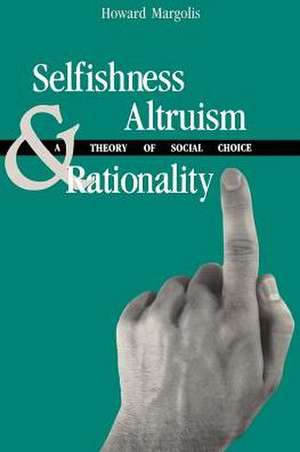Selfishness, Altruism, and Rationality
Autor Howard Margolisen Limba Engleză Paperback – 30 sep 1984
Why do we volunteer time? Why do we contribute money? Why, even, do we vote, if the effect of a single vote is negligible? Rationality-based microeconomic models are hard-pressed to explain such social behavior, but Howard Margolis proposes a solution. He suggests that within each person there are two selves, one selfish and the other group-oriented, and that the individual follows a Darwinian rule for allocating resources between those two selves.
"Howard Margolis's intriguing ideas . . . provide an alternative to the crude models of rational choice that have dominated economics and political science for too long."—Times Literary Supplement
"Howard Margolis's intriguing ideas . . . provide an alternative to the crude models of rational choice that have dominated economics and political science for too long."—Times Literary Supplement
Preț: 279.74 lei
Nou
Puncte Express: 420
Preț estimativ în valută:
53.55€ • 55.08$ • 44.43£
53.55€ • 55.08$ • 44.43£
Carte tipărită la comandă
Livrare economică 15 februarie-01 martie
Preluare comenzi: 021 569.72.76
Specificații
ISBN-13: 9780226505244
ISBN-10: 0226505243
Pagini: 201
Dimensiuni: 152 x 229 x 28 mm
Greutate: 0.27 kg
Ediția:Revised
Editura: University of Chicago Press
Colecția University of Chicago Press
ISBN-10: 0226505243
Pagini: 201
Dimensiuni: 152 x 229 x 28 mm
Greutate: 0.27 kg
Ediția:Revised
Editura: University of Chicago Press
Colecția University of Chicago Press
Notă biografică
Howard Margolis has held research and teaching appointments at the Massachusetts Institute of Technology, the Russell Sage Foundation, the Institute for Advanced Studies at Princeton, and the University of California, Irvine.
Cuprins
Preface
Special notation
Introduction
1. Overview
2. Paradoxes
3. A Darwinian argument
4. A new model
5. Applying the FS model
6. Translating across paradigms
7. Voting behavior
8. Leaders and followers
9. Sketch of further applications
Technical appendixes
A. Diagrammatic treatment of goods versus participation altruism
B. Detailed introduction of the FS model
C. Some properties of the FS model
D. Extended Lindahl-Samuelson equilibria
E. Coerced and voluntary spending
F. Interaction of FS and Schelling's "inner struggle"
G. Notes on further psychological issues
Notes
Literature cited
Index
Special notation
Introduction
1. Overview
2. Paradoxes
3. A Darwinian argument
4. A new model
5. Applying the FS model
6. Translating across paradigms
7. Voting behavior
8. Leaders and followers
9. Sketch of further applications
Technical appendixes
A. Diagrammatic treatment of goods versus participation altruism
B. Detailed introduction of the FS model
C. Some properties of the FS model
D. Extended Lindahl-Samuelson equilibria
E. Coerced and voluntary spending
F. Interaction of FS and Schelling's "inner struggle"
G. Notes on further psychological issues
Notes
Literature cited
Index
